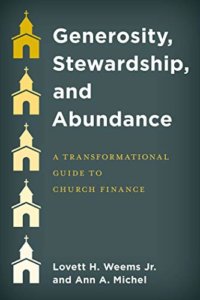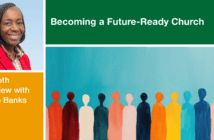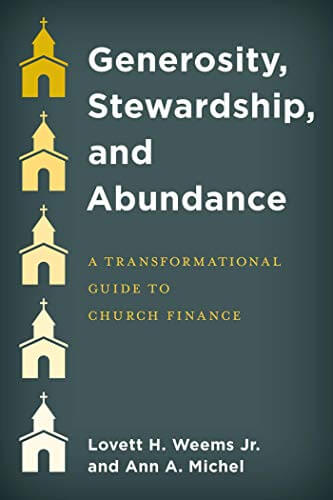How can church leaders approach stewardship and finance in ways that inspire generosity and encourage the sound use of church resources? Lewis Center Director Doug Powe speaks with Lovett H. Weems Jr. and Ann A. Michel about their new book Generosity, Stewardship, and Abundance: A Transformational Guide to Church Finances.
Listen to this interview or continue reading.
Doug Powe: A lot of books have already been published on stewardship and finances. What’s different about your approach?
Lovett Weems: Well, I don’t know if it’s different. But it tries to bring together in one place a lot of resources. Thousands of pastors, church lay officers, and even sometimes financial staff of churches, do their work every day, often without specific preparation in the areas of stewardship and finance. Some may have business experience. But many simply have not had the opportunity to study the theological dimensions of stewardship and church finances or look into research on best practices. So, we take the most-needed ideas and put them together so that a busy person who can’t dedicate a lot of extra time to this study will have what they need in one place.
Ann Michel: The book pulls together information across a wide range of subjects related to stewardship and finance. But it’s more than just one-stop shopping. We are also trying to integrate a number of different topics — personal stewardship and congregational stewardship, ministries of generosity and budgeting — and present them as part of a comprehensive theological framework.
Doug Powe: You mentioned generosity, which is actually the first word in the book’s title. A lot of people don’t think of generosity and finances together when it comes to the church. Why the term generosity?
I see generosity as the starting point because most people easily understand what it means to be generous. They have experienced God’s generosity. I sometimes even say, “Stop talking about stewardship.”
Ann Michel: Generosity is one of three foundational doctrines we emphasize in the book. Generosity is the first, then stewardship and abundance. These three core beliefs impact how individual Christians and congregations live in relation to money and possessions. This theological framework allows us to think in new and different ways about how both individuals and congregations should use the resources God has entrusted to us. I see generosity as the starting point because most people easily understand what it means to be generous. They have experienced God’s generosity. I sometimes even say, “Stop talking about stewardship,” because I think stewardship is a more difficult starting point for people not steeped in the biblical tradition.
Doug Powe: Lovett, would you like to say a little bit more, particularly related to the concept of commonwealth?
Lovett Weems: Well, one key concept in our research is thinking of every church asset — every dollar given, all church property and facilities — as part of the “commonwealth” of that community of faith. It’s not ours to use as we see fit. Everything the church receives and possesses is intended for and can be used for only one purpose, and that is to fulfill the mission that God has for the congregation. So, as Ann pointed out, the language we use is very important. We need to find those concepts that tie into our biblical and theological heritage so that we can communicate at a deep level that we are talking about something other than simply paying church bills.
Everything the church receives and possesses is intended for and can be used for only one purpose, and that is to fulfill the mission that God has for the congregation.
Ann Michel: Many churches fall into the trap of thinking about their finances in the same way the world does. It’s about paying the bills. The money people give to their church is just the price of admission, as if they were going to a movie theater. One of the great gifts of the Christian faith is the invitation to think very differently about money and possessions. And that goes way beyond just how the church pays the bills. It’s about how people live in the world. It’s a great calling that goes far beyond how the church sustains itself. It’s one of the ways God calls the church to help transform the world.
Doug Powe: I like this idea of “commonwealth.” But I’m thinking many congregations and people become really possessive. Folk feel like they have ownership over the church and its finances. Theologically, how you can help people make that shift? To understand that possessiveness is not really biblical or theological in the way you’re framing it?
Ann Michel: I think it does go back to the concept of stewardship. But sometimes we think good stewards are just good managers. And that may even reinforce our sense of ownership or possession. But actually, to be a steward is to acknowledge that we are not the owner, that God is the owner. We are only stewards of the things that we think that we possess. If we really adopt the mindset of a steward and understand biblical stewardship, we set aside our sense of ownership and possession. We realize that everything that we have, everything that our congregations have, is entrusted to us to be used, not for our own purposes, but for God’s purposes. And the idea of commonwealth is really rooted in the same idea. Wouldn’t you say, Lovett?
From the beginning of the church, people were selected to be responsible for various dimensions of the church’s outreach, including the handling of the money. But this assignment was never meant as a special prerogative. The stewardship is done on behalf of the entire Body.
Lovett Weems: Yes. From the beginning of the church, people were selected to be responsible for various dimensions of the church’s outreach, including the handling of the money. But this assignment was never meant as a special prerogative. The stewardship is done on behalf of the entire Body, and it is not something that is owned by any segment, no matter what their church office may be. We are not the owner, and our accountability — not just to ourselves and to God but to the entire community of faith — is that these funds be used to advance the mission. And we are transparent about that and communicate generously and not grudgingly with the congregation.
Doug Powe: When most church leaders think about their congregation’s finances, they think of the operating budget. Is there one best practice that all churches should follow regarding operating income and expenses?
Lovett Weems: Whatever the church, whatever the size, whatever the denomination, one key principle is that the operating budget needs to cover the recurring expenses for the given year and should be funded by recurring and predictable income. One of the biggest mistakes is when churches do not discipline themselves to fund their current operations from recurring and predictable income. When it’s hard to balance the budget, they start putting projections on to the income side. “Maybe this will happen.” “We’re going to ask people to give more.” Well, those things may happen. But you shouldn’t base someone’s salary or expenses on those hopes. If the income ends up higher than expected, there are many good ways to use it. And you will have lifted your predictable baseline for the coming year. So, try to keep an operating budget to those expenses that will be incurred in that year, and limit the income to predictable and recurring sources as best as that judgment can be made.
Doug Powe: Ann, let me ask a different question to you. You identify the problem of a “conspiracy of silence” around money when it comes to churches. Why is that and what can be done about it?
It can be very hard in a church culture that’s really buttoned up to begin to loosen up regarding money. But I think leaders can look for ways to interject conversation and vocabulary around money and giving. Pastors and other leaders can model the way.
Ann Michel: Money is often a very taboo subject within churches. This is one reason congregations struggle in inspiring people toward generosity, and it’s why so many congregations have a hard time coming to grips with their own financial reality. People often use the term “conspiracy of silence” to describe that reality. Pastors don’t want to talk about money. But that’s okay because people don’t want to hear about it either. So, everybody just agrees to stay silent on the subject. That reality is so dominant in so many congregations that some people come to see it as part of the religion. Nobody talks about money in church so it must be against the rules of God. In fact, just the opposite is true. The subject of money comes up frequently in Scripture. Certainly, Jesus talked about money more than almost any other subject, so this idea that it’s incorrect or impolite to talk about money is not rooted in our faith. It’s rooted in our culture where people don’t like to talk about money because money is equated with power. People are very skittish about it. And I think that cultural aversion to talking about money, thinking about money only in terms of power, gets imported from our culture into the churches. We have to figure out ways to get beyond that because our faith does call us to talk about money, how we live in relation to money and possessions, how we use our money properly, and how congregations use money properly. That’s where the rubber meets the road in terms of discipleship.
It can be very hard in a church culture that’s really buttoned up to begin to loosen up regarding money. But I think leaders can look for ways to interject conversation and vocabulary around money and giving. Pastors and other leaders can model the way by being a bit more open and transparent in talking about their own giving. Testimonies can be very valuable, having people talk about how they live in relation to money and possessions, how they decide what to give to the church. People consider these things very private. But we need to find ways to open up that conversation a little bit so that we can be more accountable. Accountability is essential to Christian community. But if we can’t talk honestly about these issues, then we really can’t get there.
Doug Powe: Let me follow up. Sometimes you hear in congregations that all they do is ask for money. But what I hear you saying is that we have to talk about money not just when we need to ask for it. It’s really a discipline of talking about stewardship throughout the year. So, it seems that we get trapped. People think we talk about it too much. But the reality is, we’re talking about it in the wrong way. We’re only talking about money when we are asking for it.
Ann Michel: I’m so glad you said that. One of the other reasons some pastors are so reluctant to preach about money is because they fear the perception that the church is after people’s money, and that kind of shuts things down. Because if people think they are just being asked for money, they won’t listen to the conversation. But talking about money when you’re not asking for it begins to normalize the conversation and allows people to listen in a different way. People expect to have a sermon about money on commitment Sunday. But it’s important to find other ways, other times, and other places to talk about money, not in the context of asking, but in the context of discipleship.
Never talk about people’s money apart from their discipleship. And never talk about the church’s money apart from its mission.
Lovett Weems: In the book, we talk about two principles for talking about money. One is that you never talk about people’s money apart from their discipleship. You always link the two because that’s what’s most important. And the second principle is that you never talk about the church’s money apart from its mission. If you cannot connect something for which you need money to the church’s mission, then you don’t need it. These two principles can serve as a discipline that keep us from talking about money in a purely utilitarian way.
Doug Powe: You talked about the operating budget, but we also need to talk about capital needs. Can you share a little bit about how capital needs fit into the picture, particularly as it relates to mission?
Lovett Weems: Well, for many churches, capital needs don’t fit in very well because there is so much pressure to pay operating expenses. Little attention is given to money needed for capital renewal and replacement. Then, a major piece of equipment goes down. A roof has to be replaced. And there are no funds in the operating budget because the operating budget is for things that have a life of a year.
Capital needs have a life of more than a year. Cleaning the fellowship hall is an operating expense, but refurbishing it is a capital expense. So, when one of those emergencies comes along, churches are caught. They either have to take money from other things in the operating budget or borrow money or do special fundraising. To be better prepared to meet capital needs, the first step is to identify some funding streams that can go into a capital needs fund. I said earlier that the operating budget ought to depend on recurring and predictable income. But there are other kinds of income that aren’t recurring and predictable. It may be a bequest that comes through an estate. It may be a one-time sale of property. If you establish a capital fund for this money, some people may even be encouraged to give to it. Sometimes it’s called the building fund.
Once you have some sources of funding, you’re in better shape to meet emergencies but also to start planning ahead — looking ahead five to 10 years, what capital projects are needed? Then you might develop a plan. What kind of cycle will we use to make sure that everything is painted? Or what’s our technology replacement plan? Or what roofs need to be replaced? Things like that.
Doug Powe: So, Lovett, there’s another revenue stream that some congregations have, and others do not, and that’s an endowment. Can you share a little bit about endowments? How can a congregation start one, even if they are struggling financially?
There’s actually a debate about endowments. Do they help or hurt congregations? Well, they help! If they’re handled properly and if you have good policies.
Lovett Weems: Well, there actually is a debate about endowments. Do they help or hurt congregations? Well, they help — if they’re handled properly and if you have good policies. The first policy needs to clarify the purpose of the endowment. The purpose of the endowment should be toward the future. What are those things that can make us stronger to accomplish our mission — not just how do we preserve what we have? The second policy would be the investment policy. Many churches feel they must invest their endowment where there’s no chance of it losing any value. But these funds, if it’s true endowment, are permanent funds that should be kept over a long period of time. You’re assuming that one hundred years from now you’ll still have the funds. That allows you to invest in a mix of equities and cash holdings so that you can grow at least at the rate of inflation to maintain the value of the endowment and have a steady stream of income. The third policy is the spending rate. You want a conservative spending rate. If you assume that your total return over a five-to-eight-year period would be 6% — that’s interest, dividends, and capital appreciation — and you assume a 2% inflation rate, then you would properly have a 4% spending rate. You are able to spend 4% on the purpose of the endowment and replenish the endowment by the rate of inflation simply to hold its value, and you’ll be in better shape each year that follows. But an endowment also relates to congregational stewardship because different kinds of giving tap into different types of resources. Ann may want to say something about that.
Ann Michel: Just as congregations need to think about their long-term financial needs, the same is true for individuals. It is poor stewardship for an individual to live week-to-week, month-to-month without thinking about their long-term needs. Just as individuals need to think about their monthly budget, they also need to think about their longer-term financial needs, including their lifetime assets. What happens to the things they own when they die? Part of our call to generosity and responsible stewardship includes thinking about how we can sustain the legacy of our faith beyond our own lifetime through bequests or other gifts of lifetime assets. If such a gift goes toward an endowment, it can be a lasting legacy of faith. Having an endowment is a way to encourage people to make lasting gifts of lifetime assets, both as an expression of their own personal stewardship and as a way of sustaining the future ministry of the church as well.
Doug Powe: Lovett, Ann, I’m curious. If your book really accomplishes what you hope it will, what will be different in churches?
I believe we need to think about generosity, stewardship, and abundance in a bigger way — a way that’s not just to the benefit of the institutional church but to the benefit of the world.
Ann Michel: I think a lot of people look at issues of stewardship and giving and church finance in terms of institutional thriving, and we all understand that these things are essential to the health of our institutions. So, first, I think our institutions would be healthier. But it also goes far beyond that. I believe God hasn’t given us these tools and instruments merely to sustain our institutions. The Christian belief structure with regard to generosity, stewardship, and abundance is a gift to the world. When we teach people to be generous and use resources responsibly, it has the power to transform the world. I believe we need to think about generosity, stewardship, and abundance in a bigger way — a way that’s not just to the benefit of the institutional church but to the benefit of the world.
Lovett Weems: My hope is that pastors and church financial leaders have a basis for making their decisions that goes beyond how they currently do things or their personal preferences. I hope that the book provides a way to put these decisions in a larger context. And I hope they will make sure that church finances are handled in a manner consistent with their beliefs, their mission or mission statement, and who they really are.
 Related Resources
Related Resources
- Generosity, Stewardship, and Abundance: A Transformational Guide to Church Finance (Rowman and Littlefield, 2021) by Lovett H. Weems Jr. and Ann A. Michel, available at Cokesbury and Amazon
- Changing the Tone of Conversations about Money and Church by Lovett H. Weems Jr.
- Theology of Stewardship and Biblical GenerosityVideo Tool Kit
- “The Coming Revolution in Church Economics,”a Leading Ideas Talks podcast episode featuring Mark DeYmaz
- A Gracious Invitation to Generosity by Ann A. Michel







